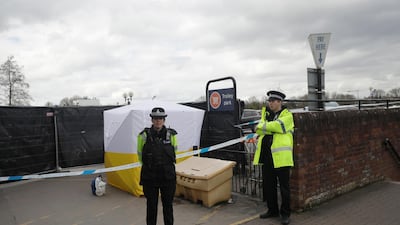The United States has said it will impose sanctions on Russia for using a chemical weapon in the attempted assassination of a former spy and his daughter in Britain earlier this year.
The penalties come despite President Donald Trump's efforts to improve relations with Russia and its leader, Vladimir Putin, and his harsh criticism of the investigation into Russian interference in the 2016 presidential election.
Mr Putin's spokesman said the US move was contrary to a "constructive" atmosphere at a Trump-Putin summit last month, and strongly denied any Russian role in the poisoning in Britain.
"In our view, these and earlier restrictions are absolutely unlawful and don't conform to international law," Dmitry Peskov said.
The State Department said the sanctions follow the US determination this week that Russia had used the Novichok nerve agent to poison Sergei Skripal and his daughter, Yulia. It said Congress was being notified of the August 6 determination and that the sanctions would take effect on or around August 22, when the finding is to be published in the Federal Register.
The sanctions will include the presumed denial of export licences for Russia to purchase many items with national security implications, according to a senior State Department official.
The US made a similar determination in February when it found that North Korea used a chemical weapon to assassinate North Korean leader Kim Jong-un's half brother at the airport in Kuala Lumpur, Malaysia, in 2017.
Mr Skripal and his daughter were poisoned by the Novichok military-grade nerve agent in the English city of Salisbury in March. Both eventually recovered. Britain has accused Russia of being behind the attack, which the Kremlin denies.
Months later, two residents of a nearby town with no ties to Russia were also poisoned by the deadly toxin. Police believe the couple accidentally found a bottle containing Novichok. One of them died.
_______________
Read more:
UK police ‘identify Russian nerve agent suspects'
UK police find source of nerve agent poisoning
_______________
The US had joined Britain in condemning Russia for the Skripal poisoning and, along with European nations, expelled Russian diplomats in response, but it had yet to make the formal determination that the Russian government had "used chemical or biological weapons in violation of international law or has used lethal chemical or biological weapons against its own nationals".
British Prime Minister Theresa May welcomed the US decision. The move sends "an unequivocal message to Russia that its provocative, reckless behavior will not go unchallenged", her office said.
Mr Peskov insisted that "there can't be any talk about Russia having any relation to the use of chemical weapons", adding that Britain had failed to present any evidence to back the claim and stonewalled Russia's proposal for a joint probe.
The Russian embassy in Washington said the "draconian" new sanctions against Russia were not backed by facts or evidence, noting that while the US said it had enough information to conclude that Russia was to blame, it refused to disclose what it had, saying the information was classified.
Konstantin Kosachev, the chairman of the foreign affairs committee in the upper house of the Russian parliament, said the US had behaved like a "police state, threatening and torturing a suspect to get evidence". He said the new sanctions amounted to "inflicting a punishment in the absence of a crime in the tradition of lynch law".
Leonid Slutsky, the head of the lower house's foreign affairs committee, denounced the sanctions as a manifestation of "unbridled Russophobia" and mockery of international law, saying that Russia may respond with countersanctions.
Mr Peskov refused to say how the Kremlin might respond, saying it needed to see what specific action the US takes before retaliating.
He insisted that Russia's financial system was strong enough to withstand shocks from the new penalties.
The Russian rouble sank to the lowest levels since April on Thursday morning before recovering slightly. The shares of Russian state-controlled banks, the national carrier Aeroflot and other companies also dropped.
However, the State Department announced a number of possible exceptions to the impending sanctions. Waivers have been issued for foreign assistance and space flight activities, while commercial passenger aviation and other commercial goods for civilian use will be assessed on a case-by-case basis, according to the official who briefed reporters.

